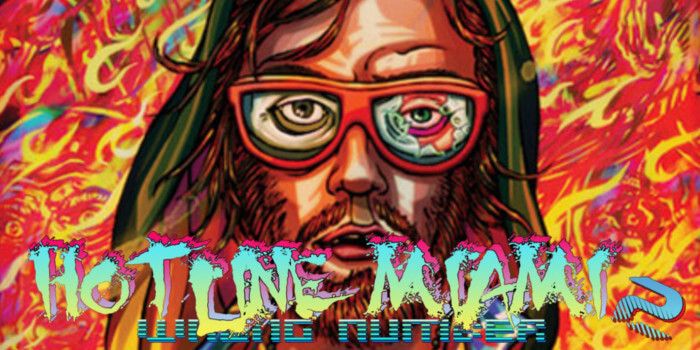Sequels can be a difficult thing to get right. The follow-up to any hit game typically has some large shoes to fill, especially when the original is as critically successful as Hotline Miami was back in 2012. However, Hotline Miami 2: Wrong Number does an admirable job of preserving what made its predecessor so great, while simultaneously expanding the game's scope in some very interesting ways.
In terms of gameplay, anyone familiar with Hotline Miami will be right at home with Wrong Number. It's a frenzied action game played from a top-down perspective, where players are tasked with traveling to a variety of locations to clear out thugs with a variety of guns and melee weapons. It's also hard as nails — the player character isn't particularly resilient, and they can die very quickly if the gamer doesn't pay attention. It's a simple matter of movement, weaponry and using the environment; once the player masters all three, they will be almost unstoppable.
However, there are a few new twists on the gameplay present in Wrong Number. Levels seem larger and more open, in a stark contrast to the typically claustrophobic environments of the original. This makes it more difficult to get a read on where foes are hiding, and seems to encourage a 'stop-and-pop' style of play rather than the free-flowing combat of the original. On the whole, it's just a case of being different rather than worse, although some levels do border on frustrating thanks to the prevalence of off-screen enemies spraying bullets around.
Graphically, the game might not be a technical showcase — but its art direction is a real treat. Anyone who grew up in the '80s or '90s will get a kick out of the game's dedication to the tropes of that era, with the crackle of VHS tape and the grime of an independent video rental store being obvious influences on its style. While the range of locales in Wrong Number are far more varied than the first game, the same level of detail is thankfully present. Despite having the immediate appearance of the crudely-drawn titles of a bygone age of video games, each stage is beautifully realized. Filth and mess have rarely been so lovingly, or accurately, depicted in video games as they are here.
That sense of grunge in the game's visual style perfectly compliments its narrative efforts. The storyline of the original Hotline Miami has been analyzed endlessly, with its approach to the disconnect between the fun of a video game and the prevalence of violence in the medium being widely praised. It would have been easy for Wrong Number to retread the same ground, and to an extent it does — but the way that it's done keeps things fresh as well as completely engrossing.
Jumping between characters, settings and time periods, Wrong Number plays out more like a television series than most episodic games manage to. Every completed stage seems to uncover a little bit more of the broader storyline, not just through the pre- and post-level cutscenes, but through the player's actions. The game's excellent soundtrack complements this rather nicely, giving every level a distinct feel and personality.
Gameplay and narrative are brought together quite seamlessly throughout Wrong Number, but its methods never seem pretentious and they don't distract from its well-refined mechanics. It's very easy to get caught up in the gameplay, killing enemies quite brutally to get towards the end of a level — only to be floored by the solemn walk back through the carnage that ends each mission. Wrong Number uses its gameplay to ask pertinent questions of the player, and that's not a common thing in the world of video games.
Similarly uncommon is the way the overarching plot is delivered. Nothing is spoon-fed; instead it demands the complete attention of the player, as every line of dialogue and visual might help to piece together what's actually going on. It's reminiscent of a television series — the excellent True Detective is perhaps an apt comparison — and it's a superb way of keeping the game's plot ticking over throughout its taut running time.
For all this, the game isn't perfect. It's a shame that the ability-granting masks from the first title are downplayed somewhat, and the level design isn't quite as on point as it was last time around. The game's difficulty also bears repeating; this is a tough, unforgiving experience. It might not be quite as difficult as its predecessor, but it's not too far off. This is a game that challenges players to learn its mechanics and become completely in tune with its central gameplay loop, but it's simultaneously a wholly novel storytelling experience. Wrong Number is yet another title that demonstrates just how much freedom an independent studio has to follow up on its ideas.
Of all the sequels set to release in 2015, there won't be many that expand upon their predecessor quite as much as Wrong Number does. It's a bigger, bolder game than the first — and while that doesn't mean it's better in every respect, it's very satisfying to see a developer push the boundaries of their own creation. Fans of the first game would have been satisfied with more of the same, but this game goes beyond the remit of a simple expansion pack. It's a supremely confident return to the ideas that made Hotline Miami so great, and a potent demonstration of a studio that's on the rise.
Hotline Miami 2: Wrong Number is available now for PC, Linux, Mac OS, PlayStation 4, PlayStation 3, and PlayStation Vita. Game Rant reviewed the PC version.

